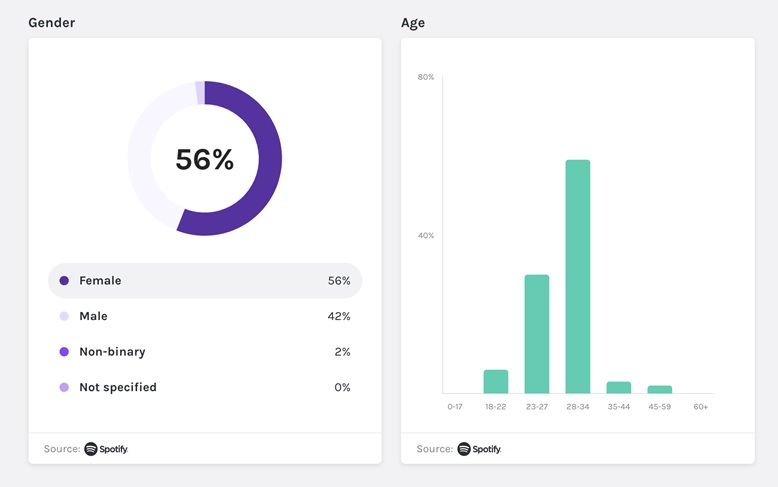Podcasting is now one of the most popular content channels. Monthly podcast listeners have grown 61.5% in three years. No wonder — listening to the au
Podcasting is now one of the most popular content channels. Monthly podcast listeners have grown 61.5% in three years. No wonder — listening to the audio on Spotify or Apple Podcasts is way more convenient than watching a video or reading an article. Listeners can do chores, have a run, or commute while getting some useful or simply fun information.
But what good does podcasting bring to the creators? A group of like-minded listeners, recognition, and;some money in the best-case scenario. Speaking of the latter, let’s discuss one of the ways to earn from podcasting — getting a sponsorship.
Why you should have podcast sponsors
When it comes to finding sponsors for your podcast, two main reasons might motivate you to do so: monetizing your hobby and developing your personal brand.
- Monetizing your hobby
Let’s be honest, podcasting deserves as much recognition as any other content making. Hours spent on researching, recording, and editing — that’s a lot of work for you. Add running social media, communicating with the audience, and it becomes at least a part-time job. Clearly, you would want to earn some money from podcasting. Not to mention the fact that getting professional equipment, such as microphones, also costs money.
- Developing your personal brand
Cooperating with sponsors doesn’t come down to the financial aspect only. If you announce that your podcast’s sponsor is a well-known brand, you will definitely gain even more acknowledgment.
Additionally, the audience of a company sponsoring you will likely find interest in your podcast, meaning new listeners and a wider audience.
Analyze your audience to find who can advertise
So, it’s clear why, as a podcast creator, you would want to find a sponsor or two to support your content both financially and in terms of PR. But how can you find a sponsor that matches your topic and values? You need to start with yourself, or, more precisely, with your audience.

Source: https://help.anchor.fm/hc/en-us/articles/360001012432-Understanding-your-podcast-analytics
Think about the demographics of your listeners. What is their age, prevailing gender, social status, income? Are they students who work part-time jobs or maybe people in their 30-s who have kids?
The easiest way to find out more about your audience is to look at the statistics from the podcasting platforms you use. You can also think about the topics you discuss in your podcast and what kind of people might be interested in these. Finally, you can even make a little questionnaire on your social media pages. We are sure that your audience will be willing to help.
Based on your findings, you can now understand what type of goods or services your audience would be willing to hear about. And that’s when you can start researching the companies you think would be interested in cooperating with you.
Create a media kit and a pitch
Suppose you made a long list of brands you want to reach out to. How do you present your podcast in the best light and convince them that it is worth sponsoring you? By creating a media kit and a pitch.
A media kit is a file that includes the information about your statistics, audience demographics, podcast story and values, and any other data that you think will represent your product and help you win the brands’ support. For example, you can also share your recent achievements or the episodes that got the most recognition.
As for a pitch, this document should include some precise information about the potential collaboration and its conditions. You might discuss the pricing range, cooperation options (such as whether you will mention the brand at the beginning of the episode, integrate the promotion as native advertising, or mention the brand on your social media).

Source:
Etsy.com
Remember, there are numerous ways to incorporate a sponsorship in your podcast, and it’s best if you list as many options as you can for the brand to choose. Of course, name only those you will be comfortable with, and which won’t impact your relationship with the audience.
Both of these documents can be presentations or just PDF files. For example, you can use Canva or similar tools to make a media kit and a pitch with the help of templates. You might send the same files to all the sponsors or tailor them depending on the brand.
Reach out to sponsors directly
Finally, when you are all prepared, it’s time to take some action. The most professional way to reach out to your potential sponsors is via email. Usually, you can find a dedicated email address for collaborations on a brand’s website or social media.
Speaking of the latter, it’s not the best idea to send DMs on Instagram or Facebook offering a partnership.
They can easily get lost in the dozens of incoming messages. What is more, social networks are not channels for business communication.
Use a professional email signature
Of course, you should always introduce yourself first in your emails. Tell the name of your podcast, its topic, maybe some short information about the podcast. The addressees will most likely want to check your social media channels, the podcast website if you have one, or even listen to an episode or two.
Instead of pasting these links each time, you can use an email signature generator. It helps you make an email signature that will be included in any letter you send. As a result, all the links and your contact information are easy to find for the potential sponsors. If you are not sure how to design your signature best, you can check out some email signature examples.

Conclusion
Being a content maker is easier if you have enough resources to keep your podcast going by rewarding your work financially and having an opportunity to invest in new equipment and scaling up. Having a Patreon account is rarely enough, so finding a reliable sponsor or two is always a good idea. What is more, it’s also a way to establish a stronger personal brand and attract a wider audience. To get a new sponsor, you just need to complete three steps: research your audience, create an attractive media kit and pitch, and reach out to the companies via email.
